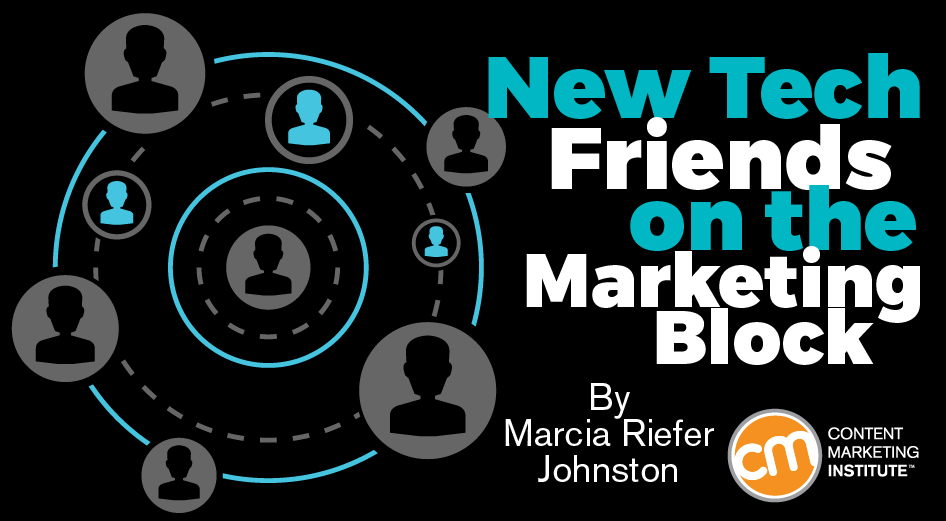Author: Marcia Riefer Johnston / Source: Content Marketing Institute The more we as marketers take on sophisticated challenges with our c

The more we as marketers take on sophisticated challenges with our content, like personalizing at scale, the more we need to work with technical specialists. Three such roles I kept hearing about at the Intelligent Content Conference are content strategists, content engineers, and data scientists.
- Content strategist – someone who plans for the creation, delivery, and governance of useful, usable content (as defined by Kristina Halvorson)
- Content engineer – someone who structures content for publishing and sets up an organization’s content systems, that is, the technologies that store, deliver, and enable governance of content assets (as described by Cruce Saunders)
- Data scientist – someone who “can demonstrate the special skills involved in storytelling with data, whether verbally, visually, or – ideally – both” (Harvard Business Review)
Together, these “three amigos of content marketing,” as content engineer Cruce Saunders refers to them, provide a power boost that can improve the efficiency and effectiveness of content marketing.
Let’s look at these roles and how marketers might work with them.
What content strategists do
As senior director of content strategy in global health sciences at The Medicines Company, Buddy Scalera characterizes his role as a “strategic superconnector.” By this, he means that the content strategist works with people across creative and technical teams to plan, create, deliver, and govern content assets across channels, audiences, purposes, and departments.
Superconnector. That sums it up.
Large organizations with complex content strategies need individuals or teams dedicated to content strategy. Small organizations may require that people in other roles (marketers, for example, or brand managers, project managers, managing editors, or administrative assistants) integrate content strategy into their jobs.
How to get the best results when collaborating with a content strategist
Buddy suggests that marketers align their commitment to brand messaging with the content strategist’s commitment to meeting business goals. This may seem obvious, but in Buddy’s experience, it needs to be said: Be willing to abandon brand messages that don’t convert people and to focus energy on content that supports business goals.
Buddy also recommends that marketers invite the content strategist’s ideas for alternatives to proxy measurements (vanity metrics): page views, likes, PDF downloads, etc. Those metrics not only fail to tell you whether your content is helping you meet your business goals, they can also mislead you. For example, unless you’re paying attention, you might put a retweet that slams your company into the win column.
Content strategists can help you identify content performance metrics that connect to conversion goals. For example, Buddy says, “If you know the total lifetime value of a customer and you know the cost per acquisition, you can compare your cost per acquisition in your content campaign. You can get a sense for how many people return and what they do to move through their user journey to get to a conversion.”
Measurements like that are not easy to set up, Buddy points out, but they’re possible with the right analytics plan. “A content strategist can help you get insights that tell you more about your ROI.”
What content engineers do
Do you plan to automate and personalize your content over multiple channels? Do you want to create advanced content-related tools, like chatbots or intelligent search engines? If so, in addition to working with a content strategist, you need to get tight with a content engineer.
Content engineers help you design and develop customized tech solutions that deliver the right content to the right people at the right time. They plan, execute, and govern content’s technical stack. In addition, Buddy says, content engineers “probably know more about the mechanics of familiar social networks than anyone else on your marketing team.” They are IT pros with a “deep, empathetic understanding of content strategy.”
How to get the best results when collaborating with a content engineer
If you’re lucky enough to have a content engineer to work with, immerse that person in your planning. As Buddy’s content engineer colleague Matt Balogh says, convey “the dream” of what you’d like to accomplish, and let the content engineer pull you back to what’s possible.
Cruce urges marketers to treat content engineers as partners in planning.
Help them understand why you’re doing what you’re doing with content. Don’t think of them just as systems builders. Collaborate with them on what your systems should be.
To help content engineers understand what you aim to accomplish with your content and what results you expect to achieve, Cruce says to share all the planning and strategy information you have. Examples:
- personas
- user stories
- customer journey maps
- customer segmentation strategies
- channel plans
- content reuse strategies
- sources of content and data
- target content channels (near term and long term)
- internal or third-party API documentation
- content workflows
- editorial and authoring processes
- content standards
- governance policies
- regulations
- SEO objectives
- competitive data
- social media scenarios
- third-party syndication destinations
…


COMMENTS